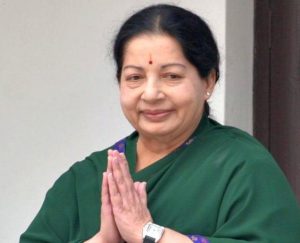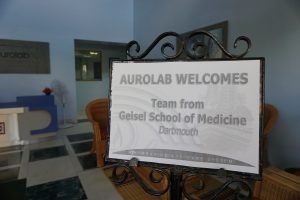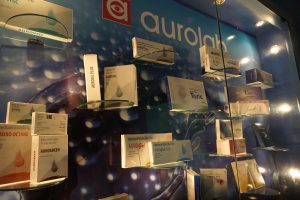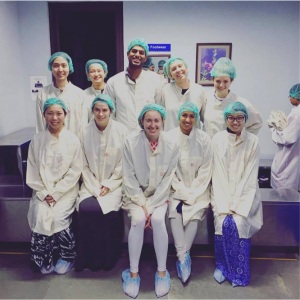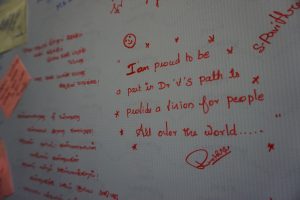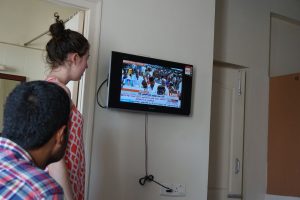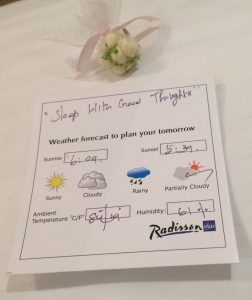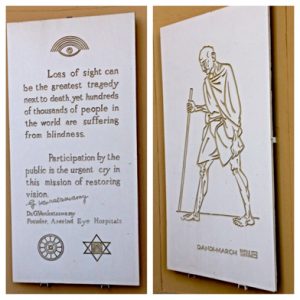
“The vision of what was possible was way beyond what was reasonable”
“It is ourselves we are helping and it is ourselves we are healing”
“ We will have differences. That’s how capitalism works.”
“ We must be efficient capitalists in order to be socialists”
“Intelligence and capability are not enough. There must be the joy of doing something beautiful.”
“This was not meant to be a business model. It was meant to be an ethical model.”
“ To eliminate needless blindness by providing high quality, high volume, compassionate care.”
– Quotes from the welcome presentation by Dr. Prajna (Aravind Eye Care Center)
“We ourselves feel that what we are doing is just a drop in the ocean. But the ocean would be less because of that missing drop,” said Mother Teresa when talking about the importance of doing what one can for humanity. Today, December 1st, Biology 70 from Dartmouth experienced this quote first hand, witnessing the many drops in the ocean that Aravind was producing.
The morning began early for many of us as the remnants of jet lag allowed us to experience the early morning cool and calm of Madurai. The mosques started their prayers at 5AM over speakers that reverberated throughout the city and the morning traffic ensued around 6AM. We enjoyed idlis and sambar for breakfast at hotel Inspiration before heading across the street to Aravind Eye Care Center. The morning welcome was warm, as the first thing we noticed when walking in was the following sign:
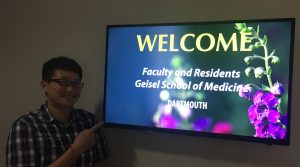
Dr. .Prajna and his two residents welcomed us into a conference room and began an inspirational presentation about Aravind. Dr. Venkataswamy initiated the eye center roughly 40 years ago in Madurai in order to treat those without access to proper eye care (to treat needless blindness). Today their mission is still to “eliminate needless blindness by providing high quality, high volume, compassionate care.” The presentation highlighted that Aravind’s strength lies in being able to overcome the seeming paradoxes in this statement – that is, the eye care center increases quality and compassion with increased quantity. The care center treats over a 1000 patients a day in its two-tiered system. There is both a paying and a free hospital and patients are given the choice to pick one or the other. Dr. Prajna noted that South Indian culture and social norms dictate that those with the money use the paying hospital and those without use the free hospital.
The Aravind system, at this point in the day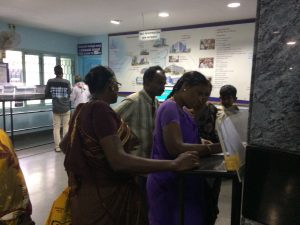 , sounded more like a Ford factory than a hospital serving an under-resourced area. Cataract surgeries were completed in record time, numbers of patients served were stunning and personnel seemed machine-like in their approach to procedures. Dr. Prajna noted poignantly, “We must be efficient capitalists in order to be socialists,” meaning Aravind seeks to operate justly within an unjust system, by using the volume of patients to their advantage.
, sounded more like a Ford factory than a hospital serving an under-resourced area. Cataract surgeries were completed in record time, numbers of patients served were stunning and personnel seemed machine-like in their approach to procedures. Dr. Prajna noted poignantly, “We must be efficient capitalists in order to be socialists,” meaning Aravind seeks to operate justly within an unjust system, by using the volume of patients to their advantage.
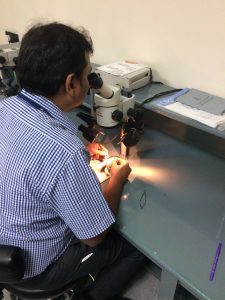 Following the presentation, we were given a guided tour throughout the paying and free hospitals. The paying hospital was teeming with patients, nurses in white saris (sisters, as they are known here), doctors in white coats, and all sorts of administrative personnel. The hospital was fully equipped with an in-house bank, a couple of cafés, and many subspecialty departments. The tour was thorough and eye-opening (pardon the pun). The hospital was more like a factory than a hospital, and it was entirely patient-centered. For example, in the free hospital, where most patients are illiterate, patients are given a slip of paper with numbers corresponding to each department of the hospital (instead of names of departments) and nurses
Following the presentation, we were given a guided tour throughout the paying and free hospitals. The paying hospital was teeming with patients, nurses in white saris (sisters, as they are known here), doctors in white coats, and all sorts of administrative personnel. The hospital was fully equipped with an in-house bank, a couple of cafés, and many subspecialty departments. The tour was thorough and eye-opening (pardon the pun). The hospital was more like a factory than a hospital, and it was entirely patient-centered. For example, in the free hospital, where most patients are illiterate, patients are given a slip of paper with numbers corresponding to each department of the hospital (instead of names of departments) and nurses 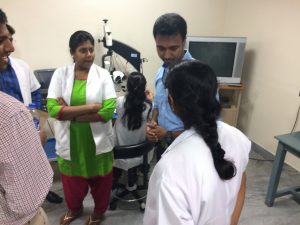 help them navigate the vast healthcare system from number to number. Signs were in three to four languages, as Aravind serves not only the city of Madurai but also patients across the state of Tamil Nadu, the country of India and as far as the Ukrainian army.
help them navigate the vast healthcare system from number to number. Signs were in three to four languages, as Aravind serves not only the city of Madurai but also patients across the state of Tamil Nadu, the country of India and as far as the Ukrainian army.
After our tour, we settled down for a hearty lunch of rice and veggies. We have been eating mostly vegetarian food since arriving in India! After lunch, we all dived in to our presentations. We walked back over to the eye care center and worked in a classroom all afternoon, perfecting and polishing up our presentations.
We came back through the drizzling rain (it hadn’t rained in Madurai for over 8 months and we brought the rain with us!). Our hotel rooms had a generous helping of mosquitos and, annoyed by their incessant buzzing and bites, we set out on a journey into the streets of Madurai in search of mosquito zapping racquets. We walked through the city like a mother duck and her nine duckings following in a single file line, from store to store in search of the perfect zappers. When we found the zappers that would bring a peaceful night, we paid 720 rupees (about $10.50) for four. We took an auto rickshaw home and debriefed about the inspirational and exhausting day.
This trip is certainly about our research and presenting our work. But I am learning that if that is all what I take away from it, then I haven’t done my duty. I was born in South India and I went to elementary school here. So, I am at least a bit aware of the difficulty of doing most things in India. It’s hard to get a passport in India without bribing someone and it would seem near impossible to do what Aravind is doing while maintaining its mission. ButI was in disbelief today. Dr. Venkataswamy, the founder of Aravind Eye Care Systems, was told repeatedly “The vision of what was possible was way beyond what was reasonable.” Aravind is unreasonable. The number of patients it treats is unreasonable. Its business model is unreasonable. Its ability to maintain quality of care is unreasonable. Its provision of healthcare to all of Tamil Nadu is unreasonable. This is what is Aravind is about – bringing to reality the unreasonable.
I am so excited by this prospect because I too hope to do what Aravind is doing in my professional career. There is nothing more that I want to see in my profession than healthcare for all. And to see Aravind is to see that it is possible. One day, far into the future, I hope to return to this very country. I hope to create hospitals and healthcare centers that treat millions of rich and poor patients, and ones that change the very landscape of healthcare. For this reason, I am so thankful for this opportunity. Thankful for the people of Dartmouth I am with, for the places we are seeing and for the work we are taking part in.
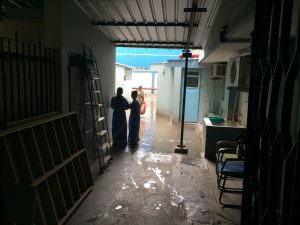
This was just day one at Aravind Eye Care System. Here’s to a great week. Here’s to many more drops in the ocean this week.
— Arun Ponshumugam ’17
(more photos to come!)


